theartsdesk on Vinyl 74: The Muppets, The Beatles, Decius, Black Lab, Black Sabbath, Tinariwen and more | reviews, news & interviews
theartsdesk on Vinyl 74: The Muppets, The Beatles, Decius, Black Lab, Black Sabbath, Tinariwen and more
theartsdesk on Vinyl 74: The Muppets, The Beatles, Decius, Black Lab, Black Sabbath, Tinariwen and more
A slightly seasonal edition of the most eclectic regular record reviews in the universe
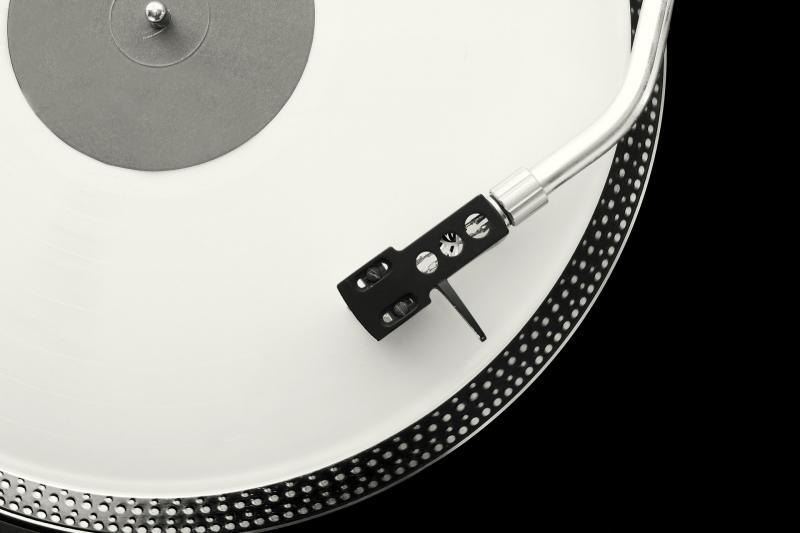
Welcome to the final theartsdesk on Vinyl of 2022 which is topped off by two Vinyl of the Months, one there for seasonal jollies and the other for musical adventurousness. As ever, the rest runs the gamut from reissues of albums from decades ago to the most contemporary, cutting edge music around. Dive in!
CHRISTMAS VINYL OF THE MONTH
Various The Muppet Christmas Carol (Walt Disney)
 Is there a more Christmassy object than a picture disc of the soundtrack to The Muppet Christmas Carol? There may be but this will do us very well. Coincidentally, theartsdesk on Vinyl’s festive film-show this year is the 1992 film so this is also a useful tool for getting in the mood (“Start dancing, Beaker!”). The Muppets have proved adept at creating timeless songs, notably “Rainbow Connection”, “It’s Not Easy Bein’ Green”, “Man or Muppet”, the saccharine “Halfway Up the Stairs” and the deadly-contagious “Mah Na Mah Na” (the latter two, admittedly, are not Muppet originals but were certainly popularised by them). Giving The Muppets a compositional hand is LA heavyweight (and Daft Punk collaborator!) Paul Williams. The album may not contain one of his or The Muppets' 24 carat classics but the overall smörgåsbord of Muppetry and yuletide schmaltz is pretty irresistible, from the Dixieland instrumental “Fozziwig’s Party” (featuring class drums from Animal) to Kermit’s sentimental “One More Sleep ‘til Christmas”, from “Christmas Scat” by Kermit and Tiny Tim (who bears a suspicious resemblance to his nephew Robin) to the finale song featuring “singing” from Michael Caine’s Scrooge. Singing Michael Caine! That’ll do. Merry Christmas!
Is there a more Christmassy object than a picture disc of the soundtrack to The Muppet Christmas Carol? There may be but this will do us very well. Coincidentally, theartsdesk on Vinyl’s festive film-show this year is the 1992 film so this is also a useful tool for getting in the mood (“Start dancing, Beaker!”). The Muppets have proved adept at creating timeless songs, notably “Rainbow Connection”, “It’s Not Easy Bein’ Green”, “Man or Muppet”, the saccharine “Halfway Up the Stairs” and the deadly-contagious “Mah Na Mah Na” (the latter two, admittedly, are not Muppet originals but were certainly popularised by them). Giving The Muppets a compositional hand is LA heavyweight (and Daft Punk collaborator!) Paul Williams. The album may not contain one of his or The Muppets' 24 carat classics but the overall smörgåsbord of Muppetry and yuletide schmaltz is pretty irresistible, from the Dixieland instrumental “Fozziwig’s Party” (featuring class drums from Animal) to Kermit’s sentimental “One More Sleep ‘til Christmas”, from “Christmas Scat” by Kermit and Tiny Tim (who bears a suspicious resemblance to his nephew Robin) to the finale song featuring “singing” from Michael Caine’s Scrooge. Singing Michael Caine! That’ll do. Merry Christmas!
NON-FESTIVE VINYL OF THE MONTH
KARU An Imaginary Journey (Beat Machine)
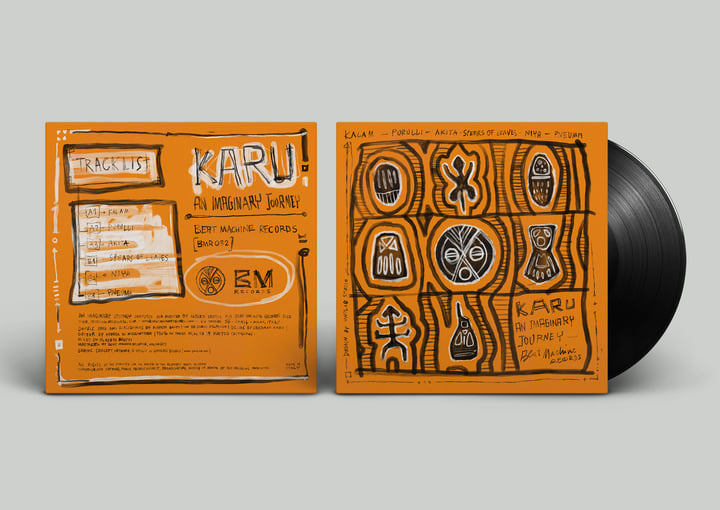 Italian double-bassist Alberto Brutti, together with saxophonist Maria D’Alfonso, guitarist Andrea di Nicolantonio, drummer Cristiano Amici, and synth-player Matteo Castiglioni, delivers the month’s most adventurous album. It may not be festive but it is boundaryless in its ambition to arrive at unexplored territory. Brutti’s mission here is to combine tribal rhythms and influences drawn from indigenous cultures with contemporary jazz. The world “psychedelic” is often used to describe particular guitar effects, wooshing synths and songs that sound like the late-1960s, but An Imaginary Journey, as its title suggests, really is a head-trip, fully psychedelic in its true sense (“mind manifesting”), going completely off-piste via percussive squiggles, sloping time signatures, distant chants, saxophonic over-layering and much else. If you want to go somewhere different, KARU are ready to take you.
Italian double-bassist Alberto Brutti, together with saxophonist Maria D’Alfonso, guitarist Andrea di Nicolantonio, drummer Cristiano Amici, and synth-player Matteo Castiglioni, delivers the month’s most adventurous album. It may not be festive but it is boundaryless in its ambition to arrive at unexplored territory. Brutti’s mission here is to combine tribal rhythms and influences drawn from indigenous cultures with contemporary jazz. The world “psychedelic” is often used to describe particular guitar effects, wooshing synths and songs that sound like the late-1960s, but An Imaginary Journey, as its title suggests, really is a head-trip, fully psychedelic in its true sense (“mind manifesting”), going completely off-piste via percussive squiggles, sloping time signatures, distant chants, saxophonic over-layering and much else. If you want to go somewhere different, KARU are ready to take you.
VINYL REVIEWS
Various Theo Parrish: DJ Kicks – Detroit Forward (!K7) + Qrauer Odd Fazes (Nonostar) + Decius Vol. 1 (Leaf)
 Three releases showcasing different aspects of the planet’s ever-thriving club culture. The never dull !K7 label often brings out the best in DJs and such is the case with their new DJ Kicks set curated by Detroit original Theo Parrish, a man who’s always bridged his hometown’s techno reputation into subtler house and disco sounds. Over three discs, representing the tunes on the equivalent mix CD, Parrish has gone to town, signing and commissioning a whole array of music from his local area, almost exclusively from artists no-one will have heard of beyond the city limits. The feel is jazzy but interlaced with steady dancefloor funk and a solid electronic drum underpinning, perhaps summed up by the gigantic double-bass’n’piano foot-shuffler “The Upper Room”. It’s a classy set whose originality is matched by a carefully
Three releases showcasing different aspects of the planet’s ever-thriving club culture. The never dull !K7 label often brings out the best in DJs and such is the case with their new DJ Kicks set curated by Detroit original Theo Parrish, a man who’s always bridged his hometown’s techno reputation into subtler house and disco sounds. Over three discs, representing the tunes on the equivalent mix CD, Parrish has gone to town, signing and commissioning a whole array of music from his local area, almost exclusively from artists no-one will have heard of beyond the city limits. The feel is jazzy but interlaced with steady dancefloor funk and a solid electronic drum underpinning, perhaps summed up by the gigantic double-bass’n’piano foot-shuffler “The Upper Room”. It’s a classy set whose originality is matched by a carefully 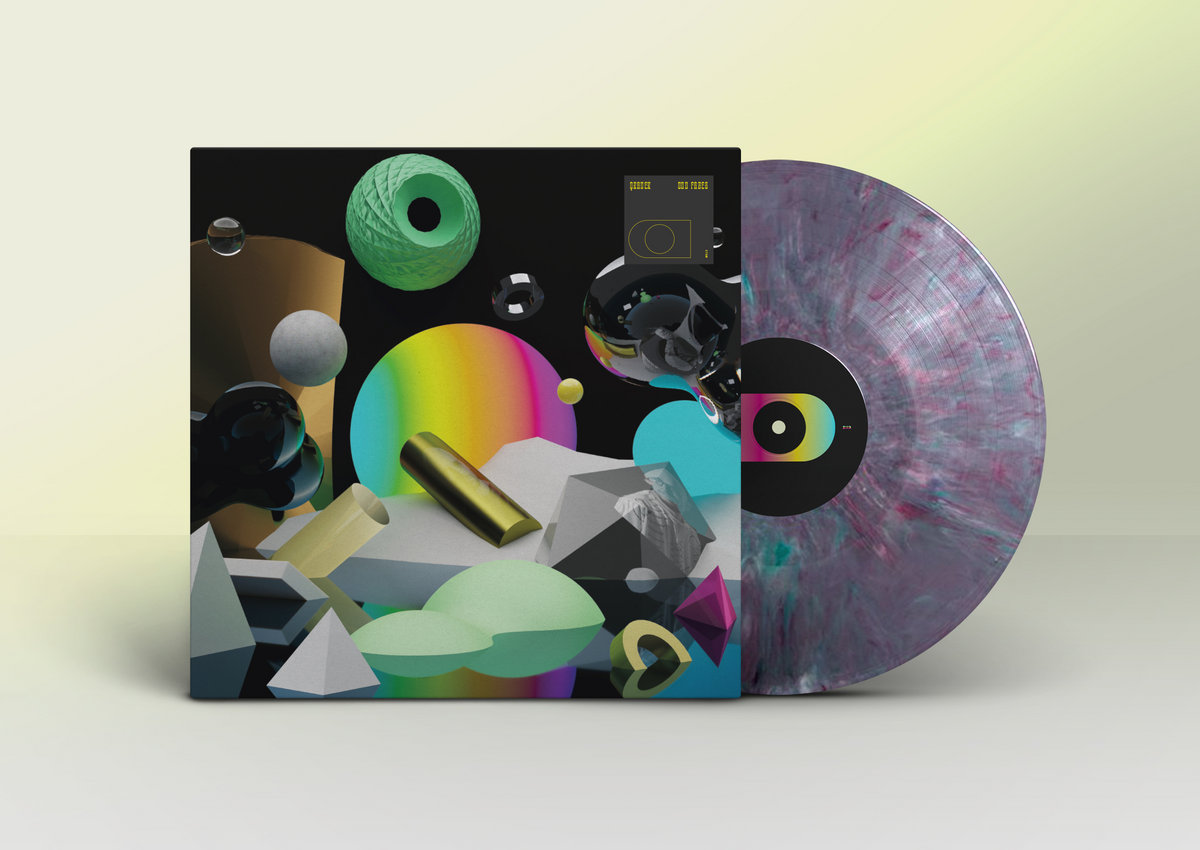 considered musicality. German label Nonostar gave us theartsdesk on Vinyl-favoured violinist-producer Alex Stolze and now here comes the bizarrely-named Qrauer, the pairing of Christian Grocha, a percussionist, and Ludwig Bauer, a pianist, both of them, clearly also into the production side of things. The label’s mission seems to be to integrate classically trained sorts into the techno world. On paper this sounds awful but if the Odd Fazes album is anything to go by, Nonostar should be encouraged. It’s minimal techno, not in that faceless early 21st century way, but in terms of a paired-back sound palette. Within it, though, there’s lots to keep ears and wriggling bodies entertained. It’s not high BPM or dynamic but there’s a persuasive array of twitches, gloops, washes, pings, bleeps and clicks that translate into 4/4 music which is weirdly jolly and holds the attention. Comes on vinyl that looks like a rainbow drowned by an oil
considered musicality. German label Nonostar gave us theartsdesk on Vinyl-favoured violinist-producer Alex Stolze and now here comes the bizarrely-named Qrauer, the pairing of Christian Grocha, a percussionist, and Ludwig Bauer, a pianist, both of them, clearly also into the production side of things. The label’s mission seems to be to integrate classically trained sorts into the techno world. On paper this sounds awful but if the Odd Fazes album is anything to go by, Nonostar should be encouraged. It’s minimal techno, not in that faceless early 21st century way, but in terms of a paired-back sound palette. Within it, though, there’s lots to keep ears and wriggling bodies entertained. It’s not high BPM or dynamic but there’s a persuasive array of twitches, gloops, washes, pings, bleeps and clicks that translate into 4/4 music which is weirdly jolly and holds the attention. Comes on vinyl that looks like a rainbow drowned by an oil  slick. Decius is Lias Saoudi of Fat White Family, Quinn Whalley of Paranoid London and the brothers Luke and Liam May of Medicine 8 and Trashmouth Records, Their debut album is everything acid house promised and techno could and should be. It’s a juggernaut of a record, massive-sounding, with Saoudi’s high-pitched vocals diving in and adding falsetto New York-ish disco flavour. Lathererd in grubby sex-cave ambience, it swerves between essential bangers such as “U-Instead of Thought”, almost-electro-pop cuts such as “Show Me No Tears”, and the relentless acid house brain-fry of “Look Like a Man”. Comes in double in art/info gatefold.
slick. Decius is Lias Saoudi of Fat White Family, Quinn Whalley of Paranoid London and the brothers Luke and Liam May of Medicine 8 and Trashmouth Records, Their debut album is everything acid house promised and techno could and should be. It’s a juggernaut of a record, massive-sounding, with Saoudi’s high-pitched vocals diving in and adding falsetto New York-ish disco flavour. Lathererd in grubby sex-cave ambience, it swerves between essential bangers such as “U-Instead of Thought”, almost-electro-pop cuts such as “Show Me No Tears”, and the relentless acid house brain-fry of “Look Like a Man”. Comes in double in art/info gatefold.
Trio SR9 Déjà Vu (No Format)
 This is light-hearted fun, an alternative Christmas office party soundtrack. French percussionists Paul Changarnier, Nicolas Cousin and Alexandre Esperet have received plaudits for their reimagining of Bach, Ravel and others on an array of percussive instruments, led by the marimba, and now, with composer Clément Ducol, they attend to contemporary pop hits. Anyone expecting bangers will be disappointed but, featuring vocalists Camille, Black Bissy, Sandra Nkaké, Camélia Jordana, and Malik Djoudi, these sparse Afro-Gallic downtempo versions have their own charm. Songs put through the filter include Lorde’s “Royals”, Pharrell Williams’ “Happy”, Billie Eilish’s “Bad Guy”, Lana del Rey’s “Video Games”. Rihanna’s “Don’t Stop the Music” and “Tones & I’s “Dance Monkey”. Comes in bright yellow info inner sleeve.
This is light-hearted fun, an alternative Christmas office party soundtrack. French percussionists Paul Changarnier, Nicolas Cousin and Alexandre Esperet have received plaudits for their reimagining of Bach, Ravel and others on an array of percussive instruments, led by the marimba, and now, with composer Clément Ducol, they attend to contemporary pop hits. Anyone expecting bangers will be disappointed but, featuring vocalists Camille, Black Bissy, Sandra Nkaké, Camélia Jordana, and Malik Djoudi, these sparse Afro-Gallic downtempo versions have their own charm. Songs put through the filter include Lorde’s “Royals”, Pharrell Williams’ “Happy”, Billie Eilish’s “Bad Guy”, Lana del Rey’s “Video Games”. Rihanna’s “Don’t Stop the Music” and “Tones & I’s “Dance Monkey”. Comes in bright yellow info inner sleeve.
Black Lab In a Bizarre Dream (New Heavy Sounds) + Grave Lines Communion (New Heavy Sounds)
 The ever-excellent New Heavy Sounds label return with a double-header. Japanese female doom metal duo Black Lab’s latest album is a career best. They have moved away from the more experimental sounds of their past output, as well as from adhering always to genre tropes (“Crows, Sparrows and Cats”, featuring Stereolab’s Laetitia Saedier on vocals, is a garage-infused rocker that’s almost pop… in a very heavy way). In a Bizarre Dream features heavy-as-osmium doom-riff monsters, but not continually and the approach pays off with floatier songs such as “Evil II” adding
The ever-excellent New Heavy Sounds label return with a double-header. Japanese female doom metal duo Black Lab’s latest album is a career best. They have moved away from the more experimental sounds of their past output, as well as from adhering always to genre tropes (“Crows, Sparrows and Cats”, featuring Stereolab’s Laetitia Saedier on vocals, is a garage-infused rocker that’s almost pop… in a very heavy way). In a Bizarre Dream features heavy-as-osmium doom-riff monsters, but not continually and the approach pays off with floatier songs such as “Evil II” adding  counterpoints to the hammering downtuned fare. Comes in lyric inner sleeve in lime and dark aquamarine-splurged vinyl. London sludge-metallers Grave Lines, on the other hand, take great pleasure in diving deep into grinding sludge-metal on their third album Communion. After it’s been on for a few minutes, listeners will either be ineffably drawn to ritual head-banging or will have left the room. In its roaring, goth-laced sluggishness, this is not music that asks to be liked. But I like it anyway. Comes in art/lyric inner sleeve on vinyl that looks like a muddied water-puddle.
counterpoints to the hammering downtuned fare. Comes in lyric inner sleeve in lime and dark aquamarine-splurged vinyl. London sludge-metallers Grave Lines, on the other hand, take great pleasure in diving deep into grinding sludge-metal on their third album Communion. After it’s been on for a few minutes, listeners will either be ineffably drawn to ritual head-banging or will have left the room. In its roaring, goth-laced sluggishness, this is not music that asks to be liked. But I like it anyway. Comes in art/lyric inner sleeve on vinyl that looks like a muddied water-puddle.
The Watersons Frost and Fire: A Calendar of Ritual and Magical Songs (Topic)
 Around the time The Beatles released “Help”, up in Hull Norma, Mike and Elaine “Lal” Waterson and their cousin John Harrison were perfecting their harmonies on a bunch of acapella folk traditionals that they'd then record in the flat of folk revivalist Bill Leader, resulting in a record that became the starting point and a staple for multiple British folkies and folk-rockers. It’s easy to hear why. This 1965 record has a feel for the pagan calendar, the rituals and the raw lives led centuries ago, the role that music had before amplification and recorded sound, the life’n’death agricultural concerns at the heart of communities long-forgotten, and the superstitions around all that which shadows us subconsciously still. It’s a cultural as much as musical experience, an important one. We rarely think back beyond half a century, a century-and-a-half at a push, but this music plugs into something much older. Since the days of Cecil Sharp and possibly before, there's been contention about how “real” folk songs are, but, without doubt, The Watersons tune into something truly bygone and take the listener to it.
Around the time The Beatles released “Help”, up in Hull Norma, Mike and Elaine “Lal” Waterson and their cousin John Harrison were perfecting their harmonies on a bunch of acapella folk traditionals that they'd then record in the flat of folk revivalist Bill Leader, resulting in a record that became the starting point and a staple for multiple British folkies and folk-rockers. It’s easy to hear why. This 1965 record has a feel for the pagan calendar, the rituals and the raw lives led centuries ago, the role that music had before amplification and recorded sound, the life’n’death agricultural concerns at the heart of communities long-forgotten, and the superstitions around all that which shadows us subconsciously still. It’s a cultural as much as musical experience, an important one. We rarely think back beyond half a century, a century-and-a-half at a push, but this music plugs into something much older. Since the days of Cecil Sharp and possibly before, there's been contention about how “real” folk songs are, but, without doubt, The Watersons tune into something truly bygone and take the listener to it.
Black Sabbath Heaven and Hell (BMG) + Black Sabbath Mob Rules (BMG) + Guns N' Roses Use Your Illusion I (Geffen/Universal) + Guns N' Roses Use Your Illusion II (Geffen/Universal)
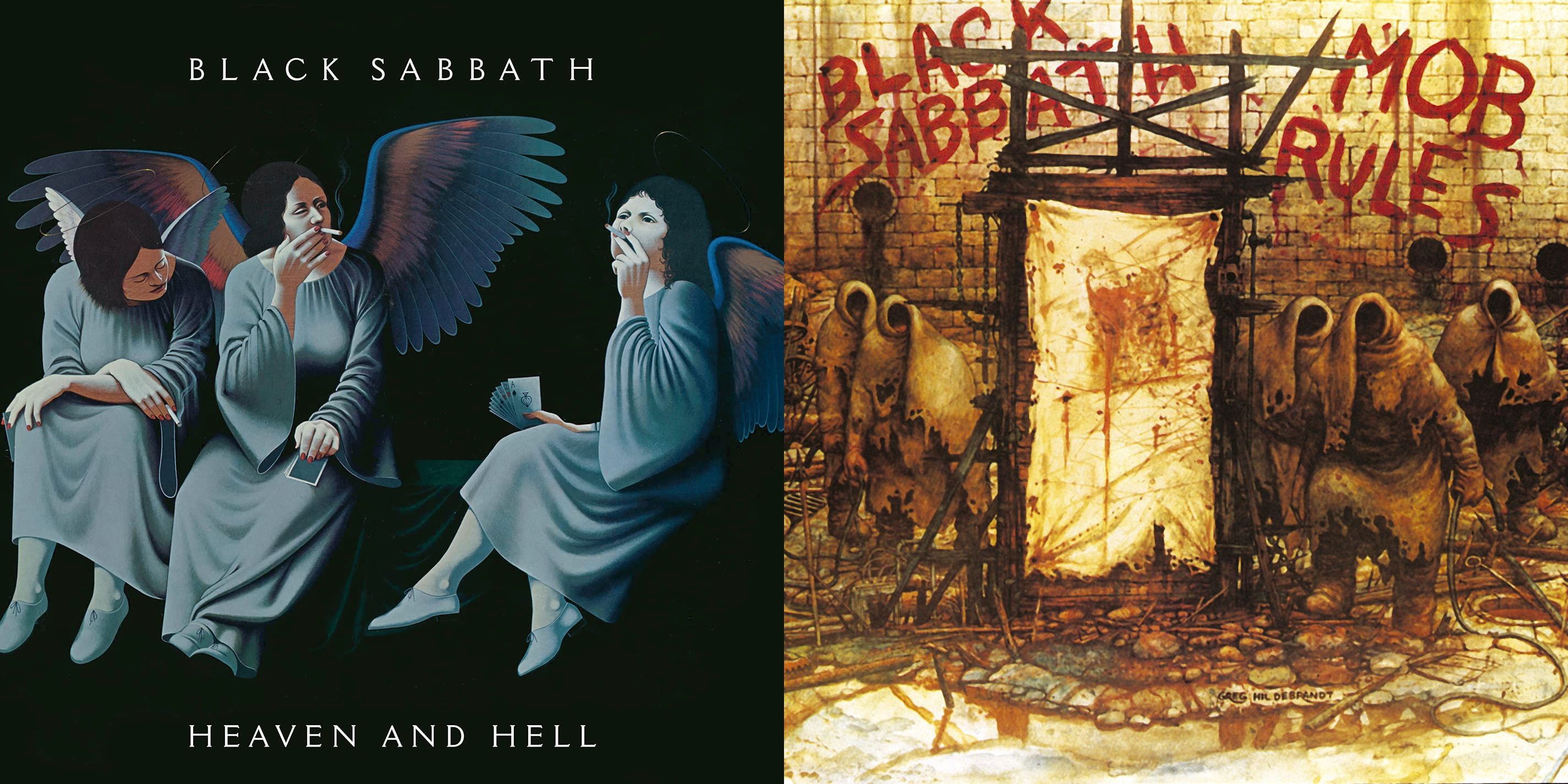 Four albums from two eras of heavy rock by two bands deeply mired, at the time, in chemical excess. In one of rock music’s most preposterous pot-calling-kettle-black situations Black Sabbath booted Ozzie Osbourne out in 1979 because he was too heavily into drink’n’drugs. Guitarist Tony Iommi, the only member, who was faintly holding it together, replaced Ozzie with diminutive inventor-of-the-devil’s-horns-fingers Ronnie James Dio and the result was Heaven and Hell in 1980, followed by Mob Rules in 1981, two albums that revitalized Sabbath and saw them have a final burst of massive global success before gradually declining over the following decade. They undoubtedly benefited from the heavy metal boom of the period. Where earlier Sabbath often experimented well outside the hard rock template, Heaven and Hell and Mob Rules hold fast to it and don’t push boundaries, often sounding as much akin to Iron Maiden and Saxon as themselves. Nevertheless, anyone in the mood will find enough to enjoy in songs such as “Die Young”, the portentous “Sign of the Southern Cross” and Heaven and Hell’s title track. Both come on double in gatefold with the second album containing live material from the same period, which is of mixed quality. It’s fair to say that in 1981 the Use Your Illusion albums were highly anticipated. Guns N’ Roses had zoomed to global fame with 1987’s Appetite For Destruction, and dived wholeheartedly into the wicked pleasures huge success brought, but, excepting the place-holder odd’n’ends mini-album G N’R Lies, they’d not consolidated their ongoing musical
Four albums from two eras of heavy rock by two bands deeply mired, at the time, in chemical excess. In one of rock music’s most preposterous pot-calling-kettle-black situations Black Sabbath booted Ozzie Osbourne out in 1979 because he was too heavily into drink’n’drugs. Guitarist Tony Iommi, the only member, who was faintly holding it together, replaced Ozzie with diminutive inventor-of-the-devil’s-horns-fingers Ronnie James Dio and the result was Heaven and Hell in 1980, followed by Mob Rules in 1981, two albums that revitalized Sabbath and saw them have a final burst of massive global success before gradually declining over the following decade. They undoubtedly benefited from the heavy metal boom of the period. Where earlier Sabbath often experimented well outside the hard rock template, Heaven and Hell and Mob Rules hold fast to it and don’t push boundaries, often sounding as much akin to Iron Maiden and Saxon as themselves. Nevertheless, anyone in the mood will find enough to enjoy in songs such as “Die Young”, the portentous “Sign of the Southern Cross” and Heaven and Hell’s title track. Both come on double in gatefold with the second album containing live material from the same period, which is of mixed quality. It’s fair to say that in 1981 the Use Your Illusion albums were highly anticipated. Guns N’ Roses had zoomed to global fame with 1987’s Appetite For Destruction, and dived wholeheartedly into the wicked pleasures huge success brought, but, excepting the place-holder odd’n’ends mini-album G N’R Lies, they’d not consolidated their ongoing musical  reputation. With Use Your Illusion I and II they deluged the public, a band apparently unable to decide which way to go so flinging everything out on two double albums. Like The Clash’s Sandinista, then, there’s too much of it, trying out too much, but there are still worthwhile things going on. Alongside a plethora of rockers of varying standards (“Double Talkin’ Jive” and “Shotgun Blues” are devil-may-care corkers) there’s the entertaining honkytonk frolic of “14 Years”, the country-ish acoustic ballad “You Ain’t the First”, the famous covers of “Live and Let Die” and “Knockin’ on Heaven’s Door”, punk shouters such as “Garden of Eden”, 10 minute epics such as “Coma”, the self-consciously “classic rock” (also cheesily enjoyable) singles “Civil War” and “November Rain”, the piano-led “Estranged”, and a whole lot else. On double vinyl in gatefold with 12” x 12” lyric inserts, the pair are a lot more invigorating to dip into than I recalled.
reputation. With Use Your Illusion I and II they deluged the public, a band apparently unable to decide which way to go so flinging everything out on two double albums. Like The Clash’s Sandinista, then, there’s too much of it, trying out too much, but there are still worthwhile things going on. Alongside a plethora of rockers of varying standards (“Double Talkin’ Jive” and “Shotgun Blues” are devil-may-care corkers) there’s the entertaining honkytonk frolic of “14 Years”, the country-ish acoustic ballad “You Ain’t the First”, the famous covers of “Live and Let Die” and “Knockin’ on Heaven’s Door”, punk shouters such as “Garden of Eden”, 10 minute epics such as “Coma”, the self-consciously “classic rock” (also cheesily enjoyable) singles “Civil War” and “November Rain”, the piano-led “Estranged”, and a whole lot else. On double vinyl in gatefold with 12” x 12” lyric inserts, the pair are a lot more invigorating to dip into than I recalled.
Ghost Car Truly Trash (One Little Independent)
 London punkers Ghost Car spit out their animated energized debut. They’re an LGBTQ+-slash-femme-centric proposition but lyrically this isn’t an agit-prop outing. The tone, instead, is fiercely irritated, chafing at boxes anyone might want to put them in, but also sniping firepower at life’s broader targets, such as on “Basta” (“I’m upset, I’m a bitch, what else can I do?/You have to admit that now, yeah, we’re through”) and the riotous B52s-in-a-wild-rage spikiness of “Selfish, Spoiled”. Elsewhere, they euphemistically proclaim lust on “Sushi Addict”, while “Clown Town” is feisty new wave-ish power-pop. Comes in lyric/photo inner sleeve.
London punkers Ghost Car spit out their animated energized debut. They’re an LGBTQ+-slash-femme-centric proposition but lyrically this isn’t an agit-prop outing. The tone, instead, is fiercely irritated, chafing at boxes anyone might want to put them in, but also sniping firepower at life’s broader targets, such as on “Basta” (“I’m upset, I’m a bitch, what else can I do?/You have to admit that now, yeah, we’re through”) and the riotous B52s-in-a-wild-rage spikiness of “Selfish, Spoiled”. Elsewhere, they euphemistically proclaim lust on “Sushi Addict”, while “Clown Town” is feisty new wave-ish power-pop. Comes in lyric/photo inner sleeve.
Tinariwen Kel Tinariwen + Aman Iman: Water is Life + Imidiwan: Companions (Craft)
 The next round of reissues from Touareg bluesmen Tinariwen can’t help but be dominated by a reproduction on vinyl of the band’s 1991 pre-recording career cassette Kel Tinariwen, recorded in Ivory Coast. The gatefold background story, told by poet, painter and Touareg activist Keltoum Sennhauser, drives home to how truly vital this music was to its makers and consumers, the only touchstone for a battered, exiled community with their heritage and freedom (“We don’t read. We’re not a people who read. So, the only reading we have, about ourselves and about the outside world, is music”). It’s so passionate and on songs such as “Adounia Tarha”, despite the language barrier, the power of feeling comes through, the sense of betrayal wound into hypnotic desert grooves. The other two releases are on vinyl for the first time and are also great. They can take a while to bed into but Aman Iman: Water is Life has an upbeat drive, claps and ululation occurring round the humming central throb, while Imidiwan: Companions has a softer-woven force, slower and more outdoors-ish. It’s tricky writing about this music as there's so much contained within which I’m not quite reaching, but it feels rewarding coming at it, and as if it will remain so for years to come. Aman Iman: Water is Life is a double, the latter two both have lyric/info inserts, and all three are worth diving deep into.
The next round of reissues from Touareg bluesmen Tinariwen can’t help but be dominated by a reproduction on vinyl of the band’s 1991 pre-recording career cassette Kel Tinariwen, recorded in Ivory Coast. The gatefold background story, told by poet, painter and Touareg activist Keltoum Sennhauser, drives home to how truly vital this music was to its makers and consumers, the only touchstone for a battered, exiled community with their heritage and freedom (“We don’t read. We’re not a people who read. So, the only reading we have, about ourselves and about the outside world, is music”). It’s so passionate and on songs such as “Adounia Tarha”, despite the language barrier, the power of feeling comes through, the sense of betrayal wound into hypnotic desert grooves. The other two releases are on vinyl for the first time and are also great. They can take a while to bed into but Aman Iman: Water is Life has an upbeat drive, claps and ululation occurring round the humming central throb, while Imidiwan: Companions has a softer-woven force, slower and more outdoors-ish. It’s tricky writing about this music as there's so much contained within which I’m not quite reaching, but it feels rewarding coming at it, and as if it will remain so for years to come. Aman Iman: Water is Life is a double, the latter two both have lyric/info inserts, and all three are worth diving deep into.
Dead Cross II (Ipecac)
 Mike Paton is always guaranteed to be into stuff that’s bloody noisy and usually a bit different. Such is the case with his group Dead Cross which consist of him, Slayer drummer Dave Lombardo, Mike Crain of hardcore punk outfit Retox, and fellow noise-punker Justin Pearson of too many bands to mention. Their music sounds like The Dead Kennedies put through an industrial shred mill. It’s punk but also thrash metal, and also something more. There are tunes but they're almost overwhelmed by a precision-tooled sonic fury. But not quite. Sample lyrics: “Flash code blue/Fucking with me and you/Breathe through a tube/Time to wake up and puke”. On gold vinyl in lyric/info inner sleeve, it’s the month’s most ballistically fuming album, but done in such a way as to be more-ish rather than just loud.
Mike Paton is always guaranteed to be into stuff that’s bloody noisy and usually a bit different. Such is the case with his group Dead Cross which consist of him, Slayer drummer Dave Lombardo, Mike Crain of hardcore punk outfit Retox, and fellow noise-punker Justin Pearson of too many bands to mention. Their music sounds like The Dead Kennedies put through an industrial shred mill. It’s punk but also thrash metal, and also something more. There are tunes but they're almost overwhelmed by a precision-tooled sonic fury. But not quite. Sample lyrics: “Flash code blue/Fucking with me and you/Breathe through a tube/Time to wake up and puke”. On gold vinyl in lyric/info inner sleeve, it’s the month’s most ballistically fuming album, but done in such a way as to be more-ish rather than just loud.
Pip Millett When Everything is Better, I’ll Let you Know (Dreamlife/Sony)
 Rising Mancunian singer Pip Millett has had a brief but prolific career so far, with three EPs/mini-albums and this “proper” debut album in only three years. It’s a double in photo/info inner sleeve and arrives in a brown paper bag with info printed on the front in white. The latter is conceptually interesting: is it a comment on the singer’s semi-naked form on the album cover? Does the brown paper bag intimate a covert aspect, suggesting debate around male-gaze objectification versus empowering ownership? The album hangs on Millett’s heartfelt drawl, riding smoked-out R&B/jazz-tronic late night grooves, with touches of Amy Winehouse about cuts such as “My Way” , heart-on-sleeve love life lyricism on songs such as “Downright”, and big trip hop bass production coming to the fore occasionally (check “I Know”). There’s a lack of variety in sonic tone, but that doesn’t negate the quality pf the best of it, and Millett sounds like an artist who’s about to have her moment in the sun.
Rising Mancunian singer Pip Millett has had a brief but prolific career so far, with three EPs/mini-albums and this “proper” debut album in only three years. It’s a double in photo/info inner sleeve and arrives in a brown paper bag with info printed on the front in white. The latter is conceptually interesting: is it a comment on the singer’s semi-naked form on the album cover? Does the brown paper bag intimate a covert aspect, suggesting debate around male-gaze objectification versus empowering ownership? The album hangs on Millett’s heartfelt drawl, riding smoked-out R&B/jazz-tronic late night grooves, with touches of Amy Winehouse about cuts such as “My Way” , heart-on-sleeve love life lyricism on songs such as “Downright”, and big trip hop bass production coming to the fore occasionally (check “I Know”). There’s a lack of variety in sonic tone, but that doesn’t negate the quality pf the best of it, and Millett sounds like an artist who’s about to have her moment in the sun.
Ride 4 EPs + Nowhere + Going Blank Again (Wichita)
 When Ride appeared out of Oxford as the 1990s began, they went from nothing to something very fast. Containing the twin songwriting talents of Mark Gardener and Andy Bell, they hit the zeitgeist just right, translating a sound that had been brewing underground with bands such as My Bloody Valentine, Spacemen 3 and Loop into something more immediately palatable. Signed to Creation they jumped straight into the charts with their stoned, chimingly tuneful feedback-rock brew (it didn’t hurt that Gardener was pretty, a fringe-in-eyes poster boy for so-called “shoegaze” music, the male counterpart to Slowdive’s Rachel Goswell – attention, incidentally, that neither of them appeared to enjoy). Those first three EPs appear collated on double vinyl in gatefold. There is something of The Smiths in there too, a jangle and a fragility, but with guitar oomph that makes it unsurprising Bell ended up in Oasis. The latter comes further to the to the fore on second album Going Blank Again in 1992, with its enormous single, a Top 10 hit no less, in “Leave Them All Behind”. Before all that, though the band were clearly on fire in 1990, delivering their debut album alongside those EPs. I think they’ve since said they felt compelled to hold people’s interest by releasing more output. This could have been a disaster but was clearly not, although Going Blank Again does feel more fully formed, with a euphoric Stone Roses feel that elevates its mood compared to Nowhere. These two also arrive in gatefold.
When Ride appeared out of Oxford as the 1990s began, they went from nothing to something very fast. Containing the twin songwriting talents of Mark Gardener and Andy Bell, they hit the zeitgeist just right, translating a sound that had been brewing underground with bands such as My Bloody Valentine, Spacemen 3 and Loop into something more immediately palatable. Signed to Creation they jumped straight into the charts with their stoned, chimingly tuneful feedback-rock brew (it didn’t hurt that Gardener was pretty, a fringe-in-eyes poster boy for so-called “shoegaze” music, the male counterpart to Slowdive’s Rachel Goswell – attention, incidentally, that neither of them appeared to enjoy). Those first three EPs appear collated on double vinyl in gatefold. There is something of The Smiths in there too, a jangle and a fragility, but with guitar oomph that makes it unsurprising Bell ended up in Oasis. The latter comes further to the to the fore on second album Going Blank Again in 1992, with its enormous single, a Top 10 hit no less, in “Leave Them All Behind”. Before all that, though the band were clearly on fire in 1990, delivering their debut album alongside those EPs. I think they’ve since said they felt compelled to hold people’s interest by releasing more output. This could have been a disaster but was clearly not, although Going Blank Again does feel more fully formed, with a euphoric Stone Roses feel that elevates its mood compared to Nowhere. These two also arrive in gatefold.
Violators of the English Language Violators of the English Language (Hypocritical Breakdown) + Magnets (Rap Group) & Proverbs Magnetic Prophecies (Golden Lion Sounds) + Rainy Miller Desquamation (Fire. Burn, Nobody) (Head II)
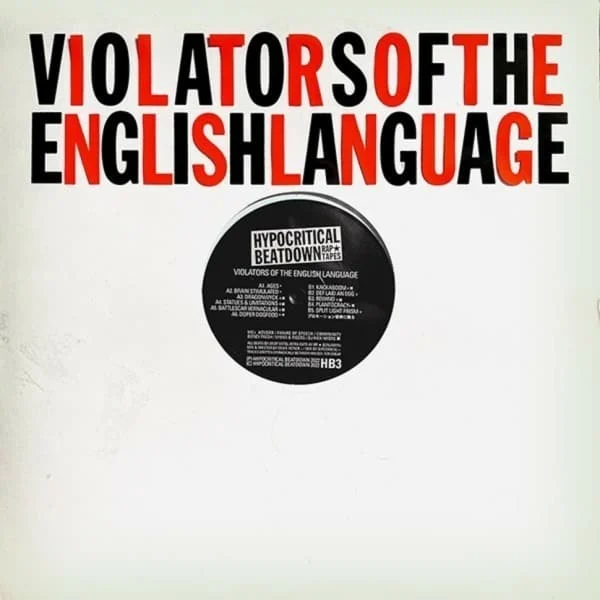 Three albums that offer different windows on hip hop. The info around Violators of the English Language is extremely arcane so, devotee fanatics, please, excuse if there’s a wrong fact here. As I understand it Violators of the English Language is a unit dating way back, based around Manchester’s Twisted Nerve Records manager-producer Andy Votel (their name is an acronym of his surname), and during lockdown they decided to reconstitute and put out recordings under their new label Hypocritical Beatdown. Thus we have the Violators of the English Language eponymous album, which arrives in a clever transparent sleeve that alternates the letters printed on the cover. It features MCs Adverb, Figure of Speech, Community, Boney Fresh and Lyons & Tigers, as well as scratching from Rick Myers, and extra production from Sean Canty of Demdike
Three albums that offer different windows on hip hop. The info around Violators of the English Language is extremely arcane so, devotee fanatics, please, excuse if there’s a wrong fact here. As I understand it Violators of the English Language is a unit dating way back, based around Manchester’s Twisted Nerve Records manager-producer Andy Votel (their name is an acronym of his surname), and during lockdown they decided to reconstitute and put out recordings under their new label Hypocritical Beatdown. Thus we have the Violators of the English Language eponymous album, which arrives in a clever transparent sleeve that alternates the letters printed on the cover. It features MCs Adverb, Figure of Speech, Community, Boney Fresh and Lyons & Tigers, as well as scratching from Rick Myers, and extra production from Sean Canty of Demdike  Stare and the late Dan Dwayre of Black Lodge. The tunes were, it says on the vinyl, “written sporadically between 1991/2021”. I don’t know if this means they were also recorded during that period. I have a feeling they may have been on cassettes, but I don’t know. This is undoubtedly just how the makers, who value opacity, like it. The music is old school and recorded loud to vinyl. It’s one for the proper B-boys and girls, without doubt. For theartdesk on Vinyl, the spin-off groups are of more interest; Magnets (Rap Group) and Pro-Verbs (who were also on last year’s Hypocritical Beatdown tape compilation), their eponymous 10”, on butter yellow vinyl, contains numbers that definitely were originally released on tape. Each group take a side and four tracks each. MCs Adverb, Benjamin, Penny Chew and Figure of
Stare and the late Dan Dwayre of Black Lodge. The tunes were, it says on the vinyl, “written sporadically between 1991/2021”. I don’t know if this means they were also recorded during that period. I have a feeling they may have been on cassettes, but I don’t know. This is undoubtedly just how the makers, who value opacity, like it. The music is old school and recorded loud to vinyl. It’s one for the proper B-boys and girls, without doubt. For theartdesk on Vinyl, the spin-off groups are of more interest; Magnets (Rap Group) and Pro-Verbs (who were also on last year’s Hypocritical Beatdown tape compilation), their eponymous 10”, on butter yellow vinyl, contains numbers that definitely were originally released on tape. Each group take a side and four tracks each. MCs Adverb, Benjamin, Penny Chew and Figure of 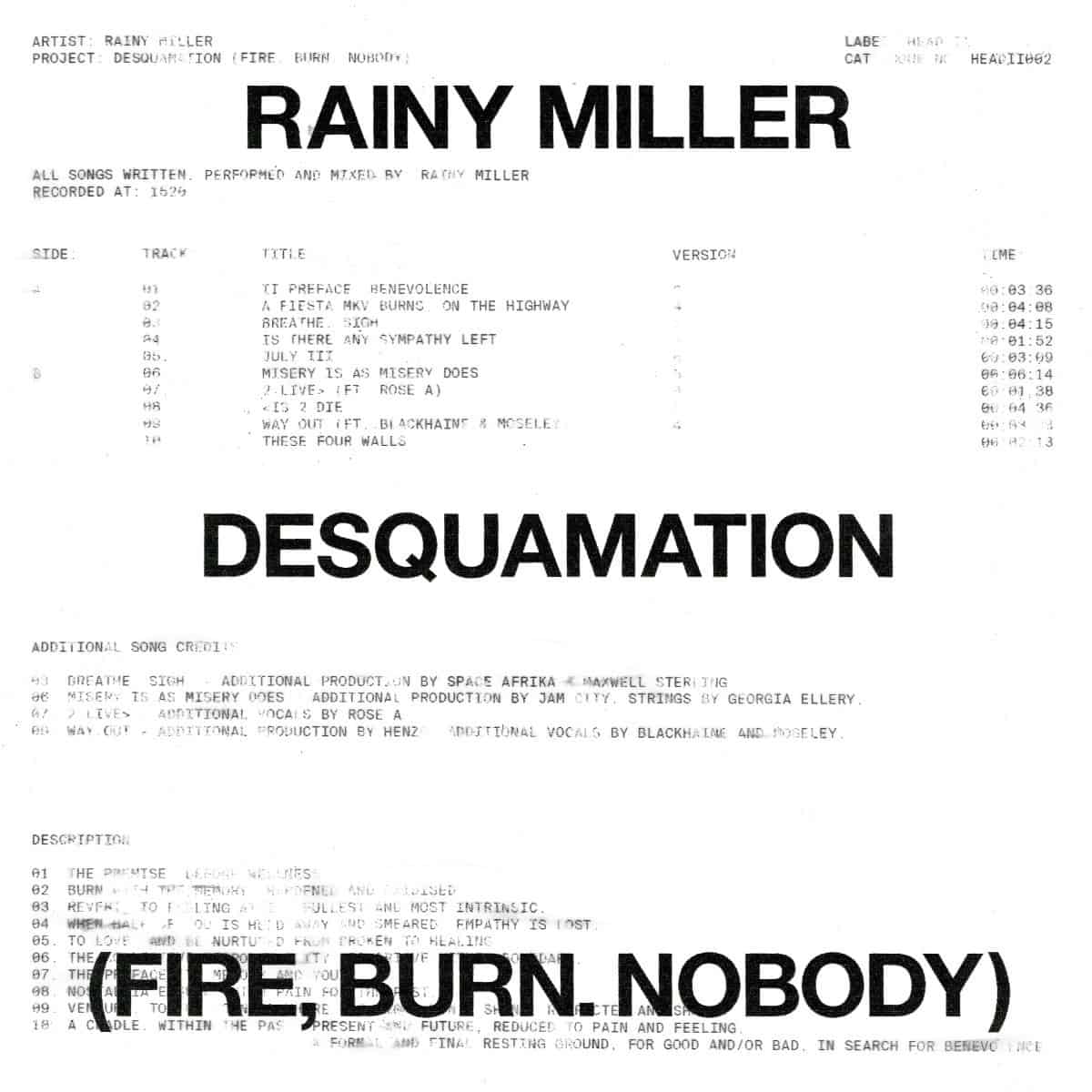 Speech deliver great, chewy wordplay throughout over Andy Votel’s busy stew of beats and samples but the stand-out cut is the percussive abstract funk of “Panic” which should, by rights, be lighting up dancefloors everywhere. Rainy Miller is also Mancunian but of a different generation and his second album offers up a very different take on hip hop, unrecognizable even as hip hop in places. Miller is happy to utilise Drake-esque autotune but Desquamation (Fire. Burn, Nobody) is very far from pop. Miller is as much about avant-ambient electronic experimentation, hints of Burial, here and there, and of alt-R&B. It’s not immediate but it is interesting and different; the listener as likely to come across electronic noisiness of the Aïsha Devi variety as grim-eish rapping.
Speech deliver great, chewy wordplay throughout over Andy Votel’s busy stew of beats and samples but the stand-out cut is the percussive abstract funk of “Panic” which should, by rights, be lighting up dancefloors everywhere. Rainy Miller is also Mancunian but of a different generation and his second album offers up a very different take on hip hop, unrecognizable even as hip hop in places. Miller is happy to utilise Drake-esque autotune but Desquamation (Fire. Burn, Nobody) is very far from pop. Miller is as much about avant-ambient electronic experimentation, hints of Burial, here and there, and of alt-R&B. It’s not immediate but it is interesting and different; the listener as likely to come across electronic noisiness of the Aïsha Devi variety as grim-eish rapping.
CoH meets Abel Mogard COH meets Abel Mogard (Houndstooth) + Tristan Bres Levitation (Dog Tooth)
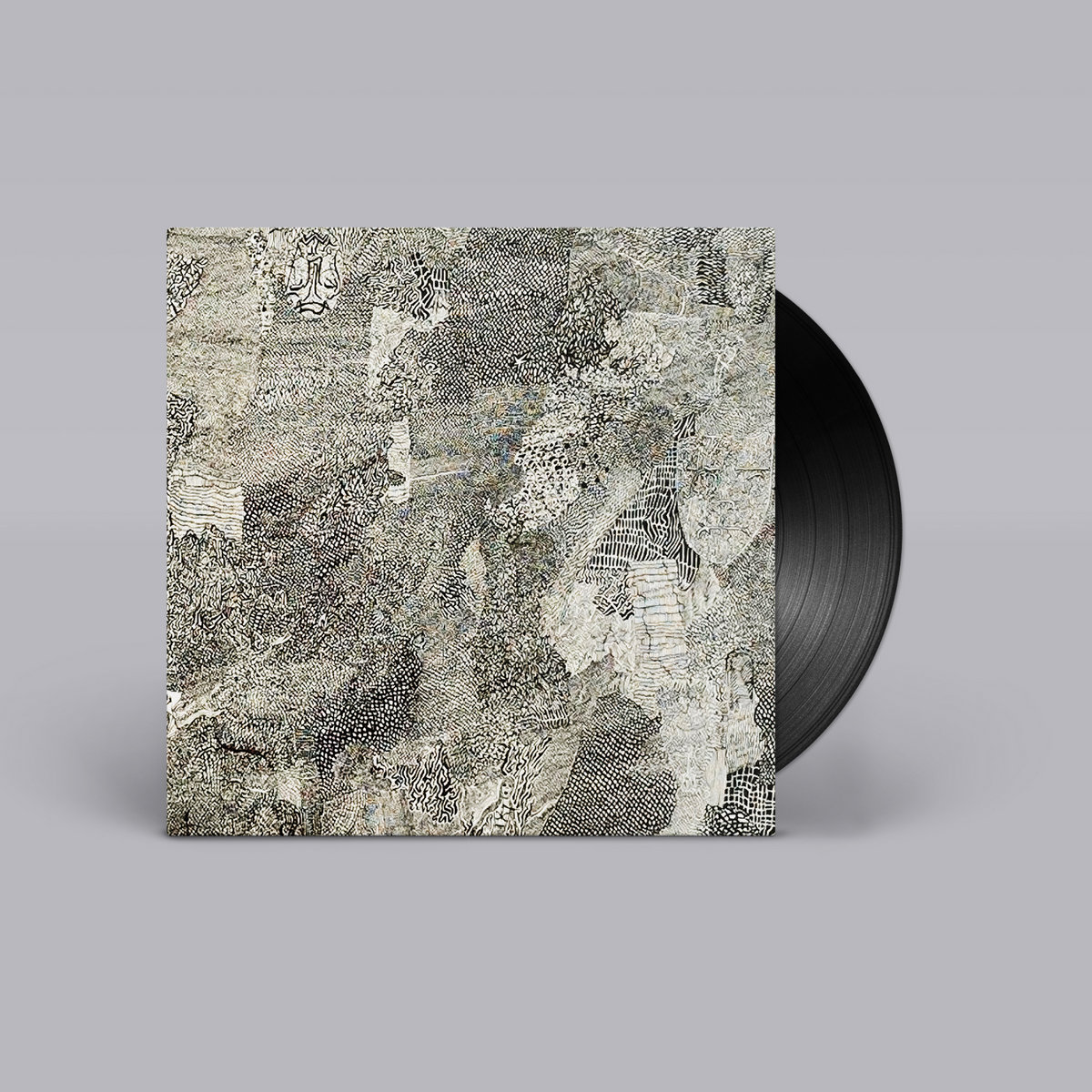 Talking of Aïsha Devi, her Houndstooth Records labelmate Abel Mogard has a 12” four tracker out with Psychic TV/Coil associate Ivan Pavlov AKA CoH. Abel Mogard has recently been revealed as a pseudonym for Italian electronic underground producer Guido Zen. The pair conjure up smeared, glitched juddering sound-sprawls, often doomy-sounding, machine-fuzzed. It is not a welcoming music, but unlike so much material of this ilk, bear with it and it rewards. Much of it is not a million miles from the music Eduard Artemyev provided for Andrei Tarkovsky’s Soviet-era sci-fi classic Stalker – sinister, compulsive, industrially scarred, and droney – but one track, “Traverse Within”, builds up a head of steam, crunching along, a droid meditation for a dystopian nowhere-scape.
Talking of Aïsha Devi, her Houndstooth Records labelmate Abel Mogard has a 12” four tracker out with Psychic TV/Coil associate Ivan Pavlov AKA CoH. Abel Mogard has recently been revealed as a pseudonym for Italian electronic underground producer Guido Zen. The pair conjure up smeared, glitched juddering sound-sprawls, often doomy-sounding, machine-fuzzed. It is not a welcoming music, but unlike so much material of this ilk, bear with it and it rewards. Much of it is not a million miles from the music Eduard Artemyev provided for Andrei Tarkovsky’s Soviet-era sci-fi classic Stalker – sinister, compulsive, industrially scarred, and droney – but one track, “Traverse Within”, builds up a head of steam, crunching along, a droid meditation for a dystopian nowhere-scape.  French Jazz bassist Tristan Bles comes at similar territory from a different angle. Levitation is a project put together with Jean-Camille Goimard of the contemporary dance company Au Delà du Bleu and is a looping textural exercise created using treated piano, old analogue synths and digital manipulation. It is not grim-faced like the CoH/Mogard release, but emphasises the mantric aspects, resulting in a music that has touches of Philip Glass about it, repeating patterns building to something almost ethereal. Music to become lost in. The vinyl is made by Green Vinyl who state that their records have 85% less carbon impact than regular vinyl. And I honestly did not put these releases together because one is on Houndstooth Records and the other Dog Tooth!
French Jazz bassist Tristan Bles comes at similar territory from a different angle. Levitation is a project put together with Jean-Camille Goimard of the contemporary dance company Au Delà du Bleu and is a looping textural exercise created using treated piano, old analogue synths and digital manipulation. It is not grim-faced like the CoH/Mogard release, but emphasises the mantric aspects, resulting in a music that has touches of Philip Glass about it, repeating patterns building to something almost ethereal. Music to become lost in. The vinyl is made by Green Vinyl who state that their records have 85% less carbon impact than regular vinyl. And I honestly did not put these releases together because one is on Houndstooth Records and the other Dog Tooth!
The Beatles Revolver Super Deluxe Boxset (Apple/Universal)
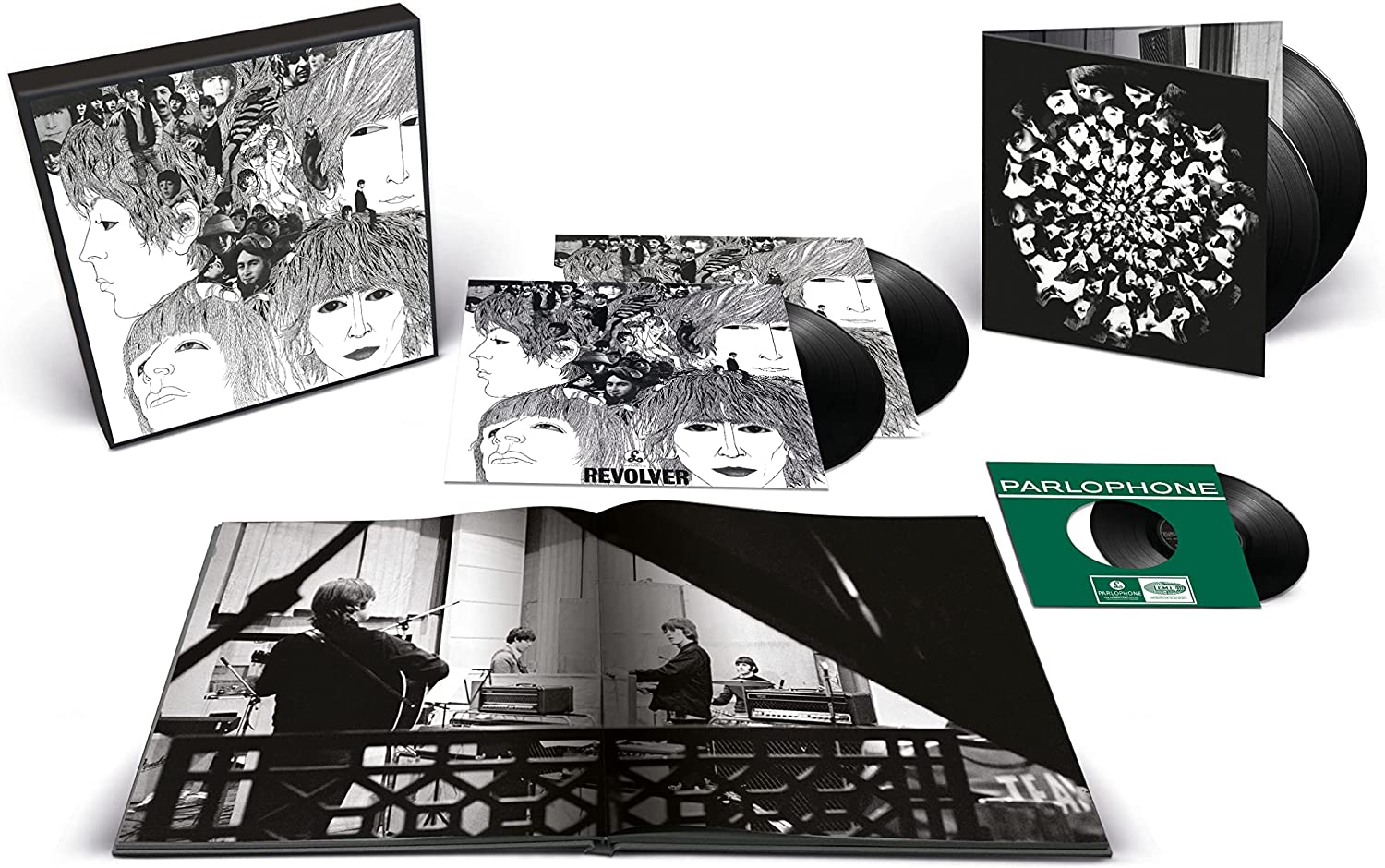 Here’s a Christmas present for grandad. Or is it? Could be for anyone, really. Revolver is, after all, famously, yet another benchmark album from a band whose career was made up of benchmark albums. It returns in boxset form for the completist. This means grandad (or whoever) gets the old 1966 mono mix alongside a new stereo mix courtesy of George’s son Giles Martin and multiple Grammy-winning Abbey Road engineer Sam Okell. On top of those, there’s two albums of outtakes, demos and the like, including studio chatter, a 7” EP containing mono and stereo mixes, and a 100-page hardback book with a foreword by Paul McCartney alongside loads of geeky background info and rare photos. And so to the music. I could never stand “Yellow Submarine” as I had to sing it at primary school a lot, probably taught by hippies. But never mind that, this is the album where the Beatles started expanding their minds before taking full lysergic flight – just check out the gurgling, droney demo of “Tomorrow Never Knows”. Having recently watched Peter Jackson’s strangely compulsive and poignantly humorous Get Back doc, the outtake/demo material is more resonant than it might usually be… and I much prefer the demo versions of “”Yellow Submarine”, pleasing pot-addled alt-folk lo-fi strummery. It's the album with “Eleanor Rigby”. Most albums can’t say that.
Here’s a Christmas present for grandad. Or is it? Could be for anyone, really. Revolver is, after all, famously, yet another benchmark album from a band whose career was made up of benchmark albums. It returns in boxset form for the completist. This means grandad (or whoever) gets the old 1966 mono mix alongside a new stereo mix courtesy of George’s son Giles Martin and multiple Grammy-winning Abbey Road engineer Sam Okell. On top of those, there’s two albums of outtakes, demos and the like, including studio chatter, a 7” EP containing mono and stereo mixes, and a 100-page hardback book with a foreword by Paul McCartney alongside loads of geeky background info and rare photos. And so to the music. I could never stand “Yellow Submarine” as I had to sing it at primary school a lot, probably taught by hippies. But never mind that, this is the album where the Beatles started expanding their minds before taking full lysergic flight – just check out the gurgling, droney demo of “Tomorrow Never Knows”. Having recently watched Peter Jackson’s strangely compulsive and poignantly humorous Get Back doc, the outtake/demo material is more resonant than it might usually be… and I much prefer the demo versions of “”Yellow Submarine”, pleasing pot-addled alt-folk lo-fi strummery. It's the album with “Eleanor Rigby”. Most albums can’t say that.
Groove Armada GA Twenty Five Boxset (BMG)
 Groove Armada arrived at the tail-end of the boom times for electronic dance music, but just made it into the club culture nostalgia bracket via their timeless Balearic opening shot “At the River”, and the solid millennial bangers “Superstylin’” and “I See You, Baby” (Norman Cook mix). Both are here in their “2020 Version”s. Listening to the 2020 Version of "Song 4 Mutya" (a hat-tip-to-Numan electropop featuring the Sugababe) and the original… perhaps the new one is fatter-sounding? Perhaps I need new ears. What the boxset offers is a double album of all the hits on gatefold in photo inner sleeves (and the equivalent double CD), as well as a book of photos and blah by Andy Cato of the band. The duo never quite developed the same fanatical following as similar acts of their vintage, perhaps because sometimes their tunes veer towards club grooves rather than TUNES and/or their crossover construction seems over-calculated. But they’ve been able to rock dancefloors for quarter of century and headline festivals as a band (they say that’s all over, as of this year) because on cuts such as “Superstylin’” and the 2007 Top 10 hit “Get Down”, featuring female dancehall/UK garage MC Stush, they hold their own with the likes of Chemical Brothers. In any case, if one of your family needs urging to booty-shake their rave arses round the Christmas tree, this will do the job. And there’s an A3 poster too!
Groove Armada arrived at the tail-end of the boom times for electronic dance music, but just made it into the club culture nostalgia bracket via their timeless Balearic opening shot “At the River”, and the solid millennial bangers “Superstylin’” and “I See You, Baby” (Norman Cook mix). Both are here in their “2020 Version”s. Listening to the 2020 Version of "Song 4 Mutya" (a hat-tip-to-Numan electropop featuring the Sugababe) and the original… perhaps the new one is fatter-sounding? Perhaps I need new ears. What the boxset offers is a double album of all the hits on gatefold in photo inner sleeves (and the equivalent double CD), as well as a book of photos and blah by Andy Cato of the band. The duo never quite developed the same fanatical following as similar acts of their vintage, perhaps because sometimes their tunes veer towards club grooves rather than TUNES and/or their crossover construction seems over-calculated. But they’ve been able to rock dancefloors for quarter of century and headline festivals as a band (they say that’s all over, as of this year) because on cuts such as “Superstylin’” and the 2007 Top 10 hit “Get Down”, featuring female dancehall/UK garage MC Stush, they hold their own with the likes of Chemical Brothers. In any case, if one of your family needs urging to booty-shake their rave arses round the Christmas tree, this will do the job. And there’s an A3 poster too!
ALSO WORTHY OF MENTION
Kode9 Astro-Darien (Hyperdub) + Plaid Feorm Falorx (Warp): Two longstanding dons of exploratory electronica take us to outer space. Astro-Darien is a fascinating and beautifully presented release from the always intriguing Hyperdub label and its boss, one of the original dubstep innovators, Kode9 (Steve Goodman). On triple fold-out 10”, this isn’t so much music as the sort of thing one would sometimes hear late at night on Radio 4 when I was a kid, experimental sound-theatre, in this case with a sci-fi theme. It’s no surprise to learn that it was originally intended to be put out online as an “audio essay”. Scottish voices, sometimes robotic, alongside all manner of space race effects, offer a loosely explicated theme of Scottish emigration to space. Goodman told Crack Magazine, “What you hear… are excerpts from the T-Divine database, particularly the system struggling with the tensions embodied in the word “colony”; the disparity between the catastrophic attempt to colonise Darien in the late 17th century and the promise of a future utopian space colony.” Darien was the name given to a project to found a Scottish colony in Central America. Overall, it’s a release that’s worthwhile but not sure how much I’ll listen to it; reminds me in that sense of found sound reinterpreter Scanner. On castleton green vinyl, the packaging is impeccable and the whole thing feels very collectable. Warp Records perennials Plaid return with their 11th album which is a recreation of a set they performed at the Feorm Festival on the planet Falorx, a location where they had to be “converted into light” to survive the atmosphere, apparently. The cover art is the prime indication of what went on. The sleeve wording is restricted to an outer transparent covering while the sleeve and inner sleeve represent imagery redolent of Denis Villeneuve’s superb science fiction film Arrival crossed with hazy prog rock artwork. The music is cheerfully bubbly, engaging with a loose tunefulness rather than anything edgier. “Wondergan” sounding almost like the Seventies Moog frolics of German easy listening kingpin Klaus Wunderlich. Even moodier sounding tunes such as “Bowl” are ear-friendly rather than caustic. It sounds like the duo are having fun and that should translate to listeners who aren’t looking for vanguard experimentation.
Jimi Hendrix Experience Los Angeles Forum, April 26, 1969 (Sony): The Jimi Hendrix archives have been pretty well scoured but this concert, from which bits’n’pieces have been pulled before, now appears in its entirety on photo gatefold double vinyl. Billy Gibbons of ZZ Top was there – of course he was! – and, in the 12” x 12” 12-page booklet, provides memories of the night and other times he hung out with Hendrix. There’s also a bunch of photos and more words from Los Angeles Times journalist Randy Lewis. The night was marked by the social tensions of the time with a stage invasion and over-zealous police response, which we can hear Hendrix calming down (Bassist Noel Redding does not sound so conciliatory!). This adds another layer of interest but the music itself does the heavy lifting, clearly, with “Purple Haze”, “Voodoo Child” and “Foxey Lady” present and correct. The extraordinary guitar antics on the opening to “Red House” remind what a demon Hendrix was on the instrument, but the whole set is full of vim and excitement.
Gabe Gurnsey Diablo (Phantasy/PIAS): Factory Floor’s Gabe Gurnsey returns with a second album, four years after his debut, Physical. Where that album was consciously laced with EBM flavour, this time he steps more purposefully away from the punk-tech attitude of his day job. Together with partner Tilly Morris, Diablo provides four sides on garish fluoro-pink vinyl in word-art inner sleeves that go for a sound midway between the dark-electro end of contemporary house music and sensuous old new wave acts such as Gina X Performance, Vicious Pink and Chris & Cosey. It’s a potent listen that sets the foot tapping while never breaking a smile, and also works as a whole.
By The Sea Heaven Knows Magnolia (Dell’Orso): The latest album from Wirral act By The Sea has an affecting indie melancholy. Singer Liam Power’s voice has something of Jarvis Cocker at his most vulnerable about it, and the music combines aspects of both Aztec Camera and Ride, with a tint of Americana. These songs are often word-led, but with a likeable reverb-laden twang and jangle at the back. The band has been going for a decade, quietly getting on with something rather lovely. They continue to do so here. Comes in lyric art info inner sleeve on purple vinyl.
The Hunna The Hunna (LMW): Watford rockers The Hunna open their fourth album in style with the song “Trash”, which has a venomously howled chorus, “All they fucking want is money, money, money/They don’t care if hands get bloody, bloody, bloody.” There’s punk in The Hunna’s blood but also 21st century stadium rock aspiration. Their career is currently cruising rather than flying but these songs are sturdy, mainstream-adjacent. They're also gutsy, musically muscular, and sound like they mean it (maaan – that’s key, surely!). Comes on cyan-blue vinyl with 12” x 12” lyric/photo/info sheet and a playful set of temporary tattoos.
Soul Revivers Grove Dub (Acid Jazz) + T.P. Orchestre Poly-Rythmo’s Afro-Funk (Acid Jazz) + Various Eddie Piller & Dean Rudland present Acid Jazz (Not Jazz) (Acid Jazz)
Three from the Acid Jazz label. First off, roots reggae DJ-producer enthusiasts Nick Manasseh and David Hill fire out a dub-remixed version of their On the Grove album which came out in March. The Soul Revivers project gathered reggae big names such as Ernest Ranglin and Ken Boothe, and here their work together is put through a sweet-natured, cordially arranged deconstruction. It’s sunshine head-nod on plastic. The Afro-Funk collection gathers together seven cuts representing the best of Benin outfit T.P. Orchestre Poly-Rythmo’s career, from the late-Sixties to the early-Eighties. It’s full of rollers, the best of which might be the endless, hypnotic and xylophonic “Aiha Ni Kpe We”, but the whole lot is amiable and sets the legs jogging. Finally, Acid Jazz (Not Jazz) is a compilation celebrating the scene that cemented itself around Acid Jazz, the label and the idea. At the time, as rave culture was going bonkers, I found the Acid Jazz thing a bit up itself, music and clubs for finger-clickers with expensive clothes who didn’t like to break a proper sweat on then dancefloor, the ones who’d have preferred club culture to stick with an elegant rare groove perspective rather than blistering Belgian techno and The Prodigy et al. Now, however, such zealot perspectives are long lost to history and we’re all just a bunch of old codgers celebrating the long-ago. And, to be fair, The Quiet Boys’ bangin’ “Modal (Blue Train Dub)”, here present, would have gone down OK in The Labyrinth or wherever. Most of the album, though, is an enjoyable fusion of jazz, hip hop beats, marijuana bubbliness, and sampling technology, featuring artists such as The Ballistic Brothers, pre-Balearic A Man Called Adam and Marden Hill. It's a snapshot of a time, capturing it well… but now I’m going to put on that Quiet Boys tune again!
Various Future Bubblers 6.0 (Brownswood): Appropriately, following the review above, comes the new compilation from Brownswood, the label overseen by Gilles Peterson, who was very much part of all that Acid Jazz origination, back in the day. It’s a solid cross-selection of the new and upcoming and, like Peterson’s oeuvre in general, veers between tasteful material, such as the soulfulness of Plumm’s “To Be a Woman” and Victoria Jane’s “Good & Low-Key”, and more outré fare, such as the fast 4/4 dancefloor pulse of Nowsm’s “Rough of the Felt”, the bonged out dream-rap of Ceeow’s “Twice” and the drum & bass-goes-jazz-bananas sound of Zenel & Plumm’s “Crinje”. Well worth a listen.
Knife Girl Uniform (Soliti 101/Playground): Finnish artist Lili Aslo releases her debut after gathering taste-maker interest during 2022. Gender-fluid, her voice recalls Jonathan Richman when he’s using his cracked heartbreaking voice, and also Robert Smith of The Cure, but Aslo’s music is nothing like either of those reference points, combining moments of reflective downtempo with bursts of brass-led jazzy pop that’s joyful and catchy. She’s an original and one to watch.
Flunk Morning Star Expanded (Beatservice) + Third Attempt The Novel Sound (Beatservice): Two from Norwegian label Beatservice whose output is usually welcome. I first came across them during the millennial boom in quirky Scandinavian chill-out (which gave us Röyksopp, etc) and one of the crossover acts was Flunk, whose version of New Order’s “Blue Monday” was both a breakthrough and an albatross-round-their-neck. They always had plenty of their own songs to offer and their 2004 second album Morning Star, here on double, is a case in point. It showcases singer Anja Øyen’s cute-yet-haunted voice while the instrumentation effectively combines acoustica with electronica. Twinkling late night listening, then, with the additional bonus of extra material originally included on the American version of the album, including two covers, The Kinks “All Day and All of the Night” (as a duet) and New Order’s “True Faith”. Oslo producer Third Attempt falls into the territory we have come to expect from Beatservice (and, indeed, would not have been out of place in the aforementioned Scandy chill-out boom). His third album bobbles along with a syrupy warmth, electronica as cuddly as a duvet in midwinter, loping beats, jazz tinting, and the occasional blunted vocal.
Shotnez Dose A Nova (Batov): That Tel Aviv quartet Shotnez have members who were once involved with Balkan Beat Box may give a hint that this jazz-led outfit dabble geographically. They have not made an album for a decade but Dose A Nova sounds like a band well-oiled and in synch with their drums, bass, sax, clarinet and guitar. It’s laidback but purposeful, a mingling of everything from Ethio-jazz to North African blues grooving. The mix is clean and the mastering brings it out. It’s not in-yer-face but still tempts the ear to its charms.
Jesus Jones Liquidizer + Doubt (Demon): At the end of the 1980s some indie bands smelt change in the wind, electronic dancing’ change. For this writer, Pop Will Eat Itself and, especially, The Shamen were important conduits to a world of bangin’ beats. Other, bands took this trip too, and Jesus Jones were among them. At the time, their melding didn’t grab me; they sounded like The Wonderstuff with Clyde Stubblefield samples shoved underneath. They still do, some of the time. Their 1989 debut album Liquidizer contains the catchy single “Info Freako” – notably dated but fun – and is, at its best, a pleasing, occasionally psychedelic mess, dated, crude, punky production adding to its charm on tracks such as “Song 13”. 1991’s globally successful Doubt contains their monster hit “Right Here, Right Now”. By this point, despite stripping their sound back, and having better production, there’s something very US alt-rock about it all that appeals less. All that said, there’s a contentious but cheekily arguably case to be made that, sonically, on occasional cuts such as “Stripped”, Jesus Jones were treading a path that The Prodigy would later follow. Both albums are well-mastered and pressed so fans are well served.
Steve Bates All the Things That Happen (Constellation) + Jessica Moss Galaxy Heart (Constellation) + Black Ox Orkestar Everything Returns (Constellation)
Three from Montréal post-rock label Constellation that demonstrate why the imprint’s output is both admirable and sometimes tricky to love. With some labels, even if I only enjoy a small percentage of their releases, I cannot be help but be impressed by their determination to follow a unique and often anti-commercial vision. Such is the case with Constellation. Just check out All the Things That Happen by Winnipeg alt-scene driving force Steve Bates; “panoramic noise clouds” and “radio static blur” are mentioned in the press release and I cannot put it better. Where I live, in Worthing, we have events called Punkish-Noisish, where acts play music like this for 15 minutes and it's weirdly enjoyable drinking beer and sitting amongst like-minded souls. It’s experiential, to use a contemporary buzzword. But I'm not sure what use I have for it on vinyl. Comes in info inner sleeve. Galaxy Heart is a tad more approachable, a companion piece to the violinist-composer’s 2021 outing Phosphenes. Let us refer to the press release for some phrases again: “doomy low-end bursts”, “textural grit and timbral noise” and “slow broken steam engine beat”. True enough, but the central sound the listener hears is distorted dissonant violin amid varying degrees of arhythmic percussion and drones. Comes in art-info inner sleeve. Jessica Moss also plays in Black Ox Orkestar and their first album in 15 years is, by far, the most approachable of these three releases, an amalgam of Jewish/gypsy golf motifs and avant-indie deconstruction, reinterpretations of traditional pieces and original numbers. There are occasional outbreaks of kletzmer-centric jollity, but much of it boasts a mourning quality keyed into the memory-music of these diasporas and their history. Comes in art inner sleeve with 12” x 12” triple fold-out art/lyric sheet.
Johannes Klingebiel For Now (Bloomer): Frankfurt-raised, Berlin-based producer Johannes Klingebiel has built a small following for his club-centric cuts over the last five years or so. Via Amsterdam’s Bloomer Records he releases what is possibly his debut album (it’s unclear from all the info I can find) which is more about mood. It’s not that it doesn’t have beats, it does, but it’s more like a synthy film soundtrack of slow-building atmospherics, with occasional quiet-spoken wordage, presumably from the man himself. One for fans of conceptual home-listening electronica with a touch of the dancefloor about it.
Kutiman Open (Siyal/Kartel): Not sure who buys albums like this but am glad they do. This is Israeli musician Kutiman’s sixth album and sees him, with ease and lightly carried purpose, explore whatever global musics he fancies, the whole thing having a smart easy listening aspect, so a 21st century equivalent, perhaps, to the craze for international exotica that was a part of early Sixties lounge music. This is not just noodling, though, there are actual tunes, and even a couple of songs, featuring the singer Dekel. It’s not in-yer-face but it is genially engaging.
The Senseless Things The First of Too Many (Cherry Red) + These Animal Men (Come On, Join) The High Society (Demon) S*M*A*S*H Self Abused (Demon)
Three indie re-releases from two slightly different eras, all beloved of the guitar-obssessed NME of the time. First off the blocks were The Senseless Things, who were a hangover from a previous era, really, and not indie at all in the descriptive sense that it became. As the Eighties closed, they reminded everyone, more than a decade before Green Day took the idea global, that punk could be goofy fun and still political when it wanted to be. Cherry Red reissue a special edition of their 1991 second album The First of Too Many, which is a double, with the original album alongside a 30th Anniversary Mix which fattens and warms the whole sound. The sleeve and inner sleeves are covered with an explosion of pre-Gorillaz art from Jamie Hewlett and the gatefold is packed with photographed memorabilia. To my ears, it sounds like a snapshot of a time’n’place that's gone and that I was not part of, but if you were, this set is sumptuously presented. Next came the New Wave of New Wave, another classic NME scene, the one after the little remembered “fraggle” movement (they just couldn’t handle all that “faceless dance music” the rest of us were losing our minds to). These Animal Men and their mates S*M*A*S*H both channelled the spiky mod-ish power pop that was in vogue as the Seventies turned into the Eighties, adding a dose of rock star pose to it. Both were, possibly, a mainly live phenomenon. These Animal Men’s 1994 debut album (Come On, Join) The High Society is full of enthusiasm and energy, if far too in love with the past, while S*M*A*S*H. sound like they came up through CBGBs in the Seventies, boasting a wilfully non-singing singer and replete with strangely poignant, slow chat-singing bits. Theirs is the more original and persuasive of the pair. Comes in a logo’d inner sleeve with a 12” x 12” four-page lyric pamphlet and a 7” single of “Trainspotter/A*L*L*Y*C”.
AND WHILE WE’RE HERE
Back before the 1960s turned psychedelic the Dave Clark Five almost held their own against The Beatles in the States. It seems weird now, listening to their new 7” boxset, All the Hits (BMG), which contains 10 singles, not A's and B's but a collection of their hits presented as, essentially, double A-sides. The early stuff – “Glad All Over”, etc – has a grinning, basic beat-pop charm but by 1967, when they had their last proper US hit, “You Got What It Takes”, their now brass-backed smiley music must have sounded so yesterday. The Brits stuck with them a bit longer, as they matured into an outfit capable of vaguely post-Walker Brothers pop such as “Everybody Get Together”. The latest from Belgian songwriter Maarten Devoldere, under his Warhaus stage name, is Ha Ha Heartbreak on Play It Again Sam. His trademark post-chanson articulacy is intact on a set of songs that maintain his ongoing standards, string-laced where necessary, and slow and thoughtful. This one may be a grower There’s something easy listening about it but only in the sense that Leonard Cohen or Lee Hazlewood might fit in that category. Dragonette, once a synth-pop outfit who produced one of the best shoulda-been-a-hits of the century in “I Get Around”, is now the moniker used by Canadian frontwoman Martina Sorbara who returns signed to BMG for Twennies, a set of yacht rock-touched downtempo electro-pop. On powder pink vinyl and arriving with a poster of her, which doubles as a lyric sheet, it’s ambitious, a bit Lorde-like in places, but tricky to see who it’s aimed at. Noisier by far is the third album from self-proclaimed New Orleans punks Special Interest. Entitled Endure on Rough Trade, it comes in gatefold with a 12” x 24”poster of the band. It’s not straightforward punk, though, but squall-laden and enhanced with avant-garde-ist effects, fronted by the untamed vocals of frontperson Alli Logout. Sometime punk and ex-half-of-Carter the Unstoppable Sex Machine, Jim Bob, gathers together the cream of his nigh-on-20-years of solo albums on double in colourful cartoon art gatefold with the unambiguously titled The Essential Jim Bob. It’s sturdy proof that his spiky wit and ability to nail it to a contagious tune remain intact. Of a similar vintage and not far off in the pithy observational songwriting game, albeit of a different stripe, is Luke Haines who’s back together with REM’s Peter Buck for a double album of eccentric alt-indie pop, All the Kids Are Super Bummed Out. It’s lyrically meta and musically lo-fi-psyche-indie-punk-pop. Haines releases so much material it’s hard to keep up, but it’s generally worth a listen or three, and this is. The pair tour the UK soon. For something completely different, turn to New York electronic explorer Qasim Naqvi’s album with percussionist Andrew Cyrille and trumpet-player Wadada Leo Smith, entitled Two Centuries on Red Hook Records. On clear vinyl in photo/info inner sleeve, it takes a quiet but ear-stimulating journey around the areas where creaky, organic-sounding ambient experimentation meets the very far fringes of jazz. One for true heads. Jazzy too is Naqi Mixtape on Amai Records by Brixton musician Mansur Brown, which isn’t a mixtape at all, of course, but a record in photo inner sleeve of jazz-noodled, hip hop-touched beat jams that sound like instrumental stabs at alternative R&B. He is establishing his production credentials but this feels as if he would benefit from being part of a larger unit with a vocalist. Time will tell. Also electronic but in a rather different vein is the double LP compilation Home Listening: Acid and House on Chicago Bee Records. Its defiantly obscure raison d’etre is that contributors were “asked to imagine fusing acid and house with the Virtualsex LP which was released on Buzz in 1993” but “for repeated home listening”. Virtualsex is a cult techno collection, featuring Stacey Pullen, Derrick May and Carl Craig, which arrived out of Belgium with a 3D cover and glasses to match. Home Listening is a ploddy but good-natured set by obscure names (Derek Carr, Postelektrik, Fear-E, Etc) which pootles along, interjecting acid 303 sounds with an affable 4.00 AM back-to-mine-on-MDMA vibe. On the modern classical front Canadian composer Mathieu David Gagnon returns with his Flore Laurentienne project on Costume Records. Where Volume 1 was an attempt at encapsulating the feel of the wilderness beyond Quebec, Volume II takes us on a trip down the St Lawrence River, and is a soothing mingling of serialist patterns, electronic mellow tone poetry and clarinets. It feels like a woozy, mellow keyboard taking trip into nature. Comes on blue vinyl with an A4 info insert. Isolated up in the Scottish Highlands Lomond Campbell has multiple DIY projects on the go, music art and more, and his latest album, which arrives on One Little Independent, is called Under This Hunger Moon We Fell. Much of it falls into the avant-classical bracket, with reverbed piano and echoing lonely experimental pieces that still sustain a melancholy tune, then suddenly there are outbursts such as “The Mountain and the Pendulum”, riven with 4/4 beats. On canary yellow vinyl, like the Flora Laurentienne album, it seems that geological form has bled into it by osmosis. Bryan Senti’s debut Manu on Naïve dwells in similar territory. Based in LA, and using strings, he pays tribute to his Latin American origins, the folk music of that continent filtered through an avant-classical sensibility. It is a clever, well-executed and interesting project that deserves attention. Soundtracking of a different kind comes from the latest Made to Measure selection from Crammed Discs, the 47th volume! This time round the musicians involved were asked to theme a new work around “wordless fiction” and the results are worth a visit, by artists such as Kaitlyn Aurelia Smith, Stubbleman featuring Nils Petter Molvaer and a collaboration between Lucretia Dalt, Camille Mandoki and Matias Aguayo. It is much more bubbly and less dauntingly pretentious than it sounds. Returning to classical-ambient stylings is the latest album from Björk-sampled Italian creative Gigi Masin who returns with the chugging an ear-soothing mini-album Vahinè on his new label Language of Sound. Mingling drone strings with electronic hum, it is often drowsily ear-pleasing and hypnotic. Monolithe Noir are a Belgian outfit who utilise found materials to create the mostly rhythm-based soundscapes of their second album, Rin on Capitane Records, which musters a slow-building atmosphere. If pushed to further description, then "ambient-flavoured post-industrial Kraut-goth" might do it. Comes with a 12” x 12” double-sided art print. Warp Records regular Bibio returns on that label with his tenth album, BIB10. He’s not an artist who’s ever easy to predict, except that his sound tends not to be abrasive. He takes this to new lengths of BIB10, which, through the prism of a modern electronica, channels the likes of Steely Dan and Seventies mellow jazz-rock. That makes it sound awful but, in fact, the best of it, songs such as “Sharratt” have a sunrise Balearica cool groove. Comes on gatefold in info-art inner sleeve. Those after more traditional singer-songwriting could do worse than seek out these three: Californian artists Alela Diane maintains the standards she’s set over her nigh-on-20-year career with Looking Glass on Naïve which comes on a 12” x 24” lyric/photo/info insert; Leeds troubadour Jake Whiskin’s eponymous debut on Dance to the Radio Records. Arriving on red vinyl, these observational songs have a certain Yorkshire nostalgia but only in the sense of using what’s on your doorstep. They also sound restless for more. Third Lung are a Reading band whose work sometimes falls to singer-songwriter stylings but as often, on their debut album, Gameplay, goes for something like Britpop crossed with epic 21st century stadium rock. One their own Third Lung label, it’s not to this writer’s taste at all, but may take flight with The Script etc crowd. Finally, it sounds like it would have been a good night out seeing Gunfire Dance back in the Eighties, a Birmingham band whose look channelled the New York Dolls and whose sound hit somewhere between MC5 and Hanoi Rocks. Their brief career is captured on the raucous good time rock’nrollin’ Witness to the Crime on Easy Action Records. Mono-monikered lead singer Ant is no longer with us and the songs here are probably more a trace of what once was, rather than encapsulating their live shows. But a taste will be better than nothing if you were a fan. Now that’s more than enough words. Go and drink some brandy and eat a mince pie and leave me to do the same. Have a good one.
- We welcome any and all vinyl for review. Please hit thomash.green@theartsdesk.com for a postal address
- More vinyl reviews on theartsdesk
Buy
Share this article
The future of Arts Journalism
You can stop theartsdesk.com closing!
We urgently need financing to survive. Our fundraising drive has thus far raised £33,000 but we need to reach £100,000 or we will be forced to close. Please contribute here: https://gofund.me/c3f6033d
And if you can forward this information to anyone who might assist, we’d be grateful.

Subscribe to theartsdesk.com
Thank you for continuing to read our work on theartsdesk.com. For unlimited access to every article in its entirety, including our archive of more than 15,000 pieces, we're asking for £5 per month or £40 per year. We feel it's a very good deal, and hope you do too.
To take a subscription now simply click here.
And if you're looking for that extra gift for a friend or family member, why not treat them to a theartsdesk.com gift subscription?
more New music
 Album: Nick Mulvey - Dark Harvest Pt.1
Fourth album from unique singer-songwriter is patchy but contains gold
Album: Nick Mulvey - Dark Harvest Pt.1
Fourth album from unique singer-songwriter is patchy but contains gold
 Alan Sparhawk, EartH Theatre review - an absorbing game of two halves from the former Low mainstay
After the death of Mimi Parker, the duo’s other half embraces all aspects of his music
Alan Sparhawk, EartH Theatre review - an absorbing game of two halves from the former Low mainstay
After the death of Mimi Parker, the duo’s other half embraces all aspects of his music
 Album: Miley Cyrus - Something Beautiful
Psychedelic soft rock of staggering ambition that so, so nearly hits the brief
Album: Miley Cyrus - Something Beautiful
Psychedelic soft rock of staggering ambition that so, so nearly hits the brief
 10 Questions for musician Michael Gira
Experimental rock titan on never retiring, meeting his idols and Swans’ new album
10 Questions for musician Michael Gira
Experimental rock titan on never retiring, meeting his idols and Swans’ new album
 Album: Garbage - Let All That We Imagine Be The Light
Nineties veterans play it safe with their latest album
Album: Garbage - Let All That We Imagine Be The Light
Nineties veterans play it safe with their latest album
 Album: Sally Shapiro - Ready to Live a Lie
Dance music-inspired Swedish pop which lacks the necessary vital spark
Album: Sally Shapiro - Ready to Live a Lie
Dance music-inspired Swedish pop which lacks the necessary vital spark
 theartsdesk on Vinyl 90: Small Faces, ESKA, Luvcat, Dope Lemon, Celia Cruz, Monolake and more
The most monstrously huge regular record reviews in the universe
theartsdesk on Vinyl 90: Small Faces, ESKA, Luvcat, Dope Lemon, Celia Cruz, Monolake and more
The most monstrously huge regular record reviews in the universe
 Album: Anna Lapwood - Firedove
Broad repertoire and a strong concept
Album: Anna Lapwood - Firedove
Broad repertoire and a strong concept
 Music Reissues Weekly: Johnnie Taylor - Who's Making Love The Stax Singles 1966-1970
Proof there’s more to the soul stylist than the first big hit
Music Reissues Weekly: Johnnie Taylor - Who's Making Love The Stax Singles 1966-1970
Proof there’s more to the soul stylist than the first big hit
 Album: Morcheeba - Escape the Chaos
More of the same from the trip hop perennials but delivered with tunes and ease
Album: Morcheeba - Escape the Chaos
More of the same from the trip hop perennials but delivered with tunes and ease
 Album: Ammar 808 - Club Tounsi
Tunisian country roots meet urban tech
Album: Ammar 808 - Club Tounsi
Tunisian country roots meet urban tech
 Album: Sports Team - Boys These Days
Genial guitar pop that leans into poshness, boasts smart lyrics, but lacks musical bite
Album: Sports Team - Boys These Days
Genial guitar pop that leans into poshness, boasts smart lyrics, but lacks musical bite

Add comment